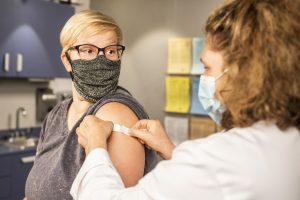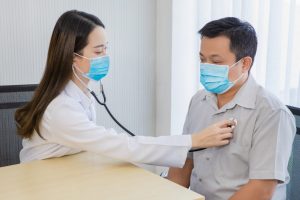Does the COVID-19 Vaccine Cause Blood Clots?
Last updated on December 20, 2021. We will continue to update this post as more information becomes available.

Image from CDC via Unsplash
On December 16, 2021, the CDC’s advisory committee unanimously voted to update their COVID-19 vaccine recommendations. They now recommend that Pfizer and Moderna COVID vaccines be given instead of the Janssen (also known as the Johnson & Johnson or J&J) vaccine, when possible and appropriate. The reason for the change is because the J&J vaccine has been linked to blood clots with low platelets in some people.
The good news is the risk of blood clots is really rare, and getting vaccination is still way safer than getting COVID. But people should get vaccinated with COVID vaccines by Pfizer or Moderna when they can, instead of the vaccine by J&J. Here’s what we know so far.
What’s the Risk?
The combination of blood clots with low platelets (known as thrombosis with thrombocytopenia or TTS) reported after the Johnson & Johnson COVID vaccine is serious and concerning. It also appears to be extremely rare.
Out of the roughly 14 million people who have received the Johnson & Johnson COVID-19 vaccine in the U.S., 57 people have experienced the condition so far, mostly women aged 18-49 years (though it’s happened in men and older adults, too). One of those cases occurred during the clinical trial prior to authorization. Unfortunately, nine people have died.
The risk of TTS varies by age and sex, but the latest estimates range from:
- 8.7 per 1 million for women aged 18-49 years
- 2.8 per 1 million for men aged 18-49 years
- 4.5 per 1 million for men and women aged 50-64 years
- 1.8 per 1 million for men and women 65+ years
Blood clots can happen for a lot of reasons — including due to COVID-19 — but these rare cases can be tricky because they require a different type of treatment. Usually, heparin is administered to people experiencing blood clots, but that can be dangerous to people with these clots combined with low levels of blood platelets. For this reason, both the FDA and CDC, along with partners across the country, are working to alert healthcare providers about this difference in treatment and reminding them to report any adverse events after vaccination to VAERS and/or V-SAFE.
It should be noted that blood clots aren’t linked to the Pfizer or Moderna COVID-19 vaccines. So even though the risk of clots after the J&J vaccine is rare, people should choose the safer vaccines by Pfizer and Moderna if they can.
How Do These Risks Compare to COVID-19?
While these clots can be very serious, so can COVID-19. Over 800,000 people have died in the U.S. since the start of the pandemic. Many more have been hospitalized (including for blood clots) or have long-term health issues.
Because COVID-19 can be so dangerous, getting vaccinated is the best way to protect yourself from getting seriously sick. The mRNA vaccines by Pfizer and Moderna are both safer and more effective than the Johnson & Johnson vaccine. If you cannot locate, or are medically unable to receive, an mRNA vaccine, you should receive a Johnson & Johnson vaccine.
What Should You Do If You Received the Johnson & Johnson COVID Vaccine?
 If you received the J&J COVID-19 vaccine within the last three weeks, please contact your healthcare provider or seek medical attention if you have:
If you received the J&J COVID-19 vaccine within the last three weeks, please contact your healthcare provider or seek medical attention if you have:
- Severe headache (especially one that starts 6+ days after vaccination)
- Backache
- New neurologic symptoms
- Severe abdominal pain
- Leg pain or swelling
- Tiny red spots on the skin
- New or easy bruising
- Shortness of breath
Please note that it is common to experience mild to moderate flu-like symptoms, including fever, headache, fatigue and joint/muscle pain, during the first week after receiving any COVID-19 vaccine. These common side effects usually start within three days of getting a vaccine and should only last a few days.
Everyone who received a COVID-19 vaccine — any COVID vaccine — should sign up for V-Safe – CDC’s After Vaccination Health Checker.
The Bottom Line…
This is a sign that the vaccine safety monitoring system is working well. It was able to find a rare, serious adverse event. It is only associated with the Johnson & Johnson (Janssen) COVID-19 vaccines, not the Pfizer or Moderna vaccines.
FDA and CDC have moved swiftly to save lives. Vaccinate Your Family will continue to share information on this situation as it develops.
In the meantime, learn more about COVID-19 and all of the COVID-19 vaccines on our website.